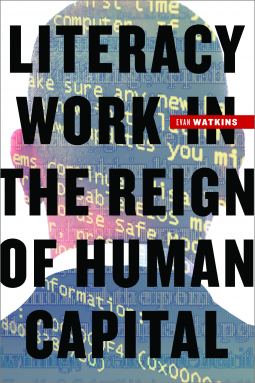
Literacy Work in the Reign of Human Capital
by Evan Watkins
This title was previously available on NetGalley and is now archived.
Send NetGalley books directly to your Kindle or Kindle app
1
To read on a Kindle or Kindle app, please add kindle@netgalley.com as an approved email address to receive files in your Amazon account. Click here for step-by-step instructions.
2
Also find your Kindle email address within your Amazon account, and enter it here.
Pub Date Jul 01 2015 | Archive Date May 21 2015
Description
As Evan Watkins shows, apprehending the meaning of literacy work requires an understanding of how literacies have changed in relation to not only technology but also to labor, capital, and economics. The emergence of new literacies has produced considerable debate over basic definitions as well as the complexities of gain and loss. At the same time, the visibility of these debates between advocates of old versus new literacies has obscured the development of more fundamental changes. Most significantly, Watkins argues, it is no longer possible to represent human capital solely as the kind of long-term resource that Gary Becker and other neoclassical economists have defined. Like corporate inventory and business management practices, human capital-labor-now also appears in a "just-in-time" form, as if a power of action on the occasion rather than a capital asset in reserve.
Just-in-time human capital valorizes the expansion of choice, but it depends absolutely on the invisible literacy work consigned to the peripheries of concentrated human capital. In an economy wherein peoples' attention begins to eclipse information as a primary commodity, a small number of choices appear with an immensely magnified intensity while most others disappear entirely. As Literacy Work in the Reign of Human Capital deftly illustrates, the concentration of human labor in the digital age reinforces and extends a class division of winners on the inside of technological innovation and losers everywhere else.
Advance Praise
"Everyone, these days, seems to be an advocate of more and better schools in order to create a more literate workforce. Watkins effectively demonstrates that’s simply not enough—not if we think seriously about literacies and the role they play in reproducing the kinds of economic and social inequalities that have emerged over the course of the past three decades."--David Ruccio, Professor of Economics, University of Notre Dame
Available Editions
| EDITION | Paperback |
| ISBN | 9780823264230 |
| PRICE | $24.00 (USD) |
Links
Average rating from 9 members
Featured Reviews
 Rachel M, Educator
Rachel M, Educator
Watkins' work presents a thorough and accessible discussion of a range of issues related to 'human capital' - a topic which was new to me, but very relevant to my work as an educator.
The tone and style are academic, but Watkins introduces and explains concepts clearly, so non-academic readers and undergraduates should be able to follow the discussion. Actually, my one criticism of the writing is that in trying to be clear, Watkins sometimes belabours points (for example the ATM analogy he uses in the introduction) which left me a little frustrated, and skimming through to find new points.
 Earl M, Reviewer
Earl M, Reviewer
Literacy Work in the Reign of Human Capital by Evan Watkins is a discussion centered largely around the ideas of various literacies, their relation to attention and attention flow, and how these combine in today's "just-in-time" form of human capital.
Watkins addresses foundational literature in the area of literacy studies as well as current arguments and debates, walking a fine line between academic and popular writing style. For the most part he succeeds in making these ideas accessible to a lay reader, such as myself. That said, it still requires both an attention to detail and perhaps a second reading to get the most out of the book. I will readily admit I missed some key points my first time through and am looking forward to a better understanding the next time through. I present the last comment as a positive, a book outside my normal scope that can motivate a second reading has managed to be interesting and well-written at the same time.
This is a valuable work for those in both education (educators in general as well as those in cultural or literacy studies) and business. The better we understand what we are really doing and how we have tried doing it, the better we can consciously and systematically teach or utilize those resources.
Reviewed from an ARC made available by the publisher via NetGalley.
Readers who liked this book also liked:
Jakub Politzer (Illustrator), Christina Dumalasova (adapter), Katerina Horakova (adapter)
Comics, Graphic Novels, Manga, General Fiction (Adult)







